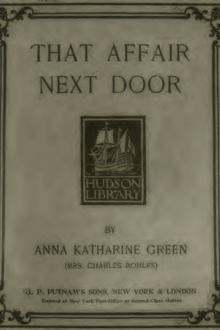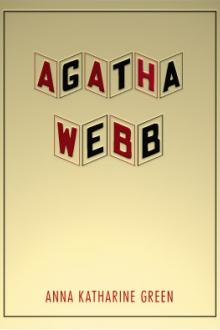The House of the Whispering Pines by Anna Katharine Green (best novels for beginners txt) 📕

- Author: Anna Katharine Green
- Performer: -
Book online «The House of the Whispering Pines by Anna Katharine Green (best novels for beginners txt) 📕». Author Anna Katharine Green
Mr. Fox pressed his advantage.
"And when you rose from the lounge and crossed your sister's hands?"
"It was still there; I put that hand uppermost."
"And left the ring on?"
"Oh, yes—oh, yes." Her whole attitude and face were full of protest.
"So that, to the best of your belief, it was still on your sister's finger when you left the room?"
"Certainly, sir, certainly."
There was alarm in her tone now, she was beginning to see that her testimony was not as entirely helpful to Arthur as she had been led to expect. In her helplessness, she cast a glance of entreaty at her brother's counsel. But he was busily occupied with pencil and paper, and she received no encouragement unless it was from his studiously composed manner and general air of unconcern. She did not know—nor did I know then—what uneasiness such an air may cover.
Mr. Fox had followed her glances, and perhaps understood his adversary better than she did; for he drew himself up with an appearance of satisfaction as he asked very quietly:
"What material did you use in lighting the fire on the club-house hearth?"
"Wood from the box, and a little kindling I found there."
"How large was this kindling?"
"Not very large; some few stray pieces of finer wood I picked out from she rest."
"And how did you light these?"
"With some scraps of paper I brought in my bag?"
"Oh—you brought scraps?"
"Yes. I had seen the box, seen the wood, but knew the wood would not kindle without paper. So I brought some."
"Did the fire light quickly?"
"Not very quickly."
"You had trouble with it?"
"Yes, sir. But I made it burn at last."
"Are you in the habit of kindling fires in your own home?"
"Yes, on the hearth."
"You understand them?"
"I have always found it a very simple matter, if you have paper and enough kindling."
"And the draught is good."
"Yes, sir."
"Wasn't the draught good at the club-house?"
"Not at first."
"Oh—not at first. When did you see a change?"
"When the note I was trying to burn flew up the chimney."
"I see. Was that after or before the door opened?"
"After."
"Did the opening of this door alter the temperature of the room?"
"I cannot say; I felt neither heat nor cold at any time."
"Didn't you feel the icy cold when you opened the dressing-closet window to throw out the phial?"
"I don't remember."
"Wouldn't you remember if you had?"
"I cannot say."
Can you say whether you noticed any especial chill in the hall when you went out to telephone?"
"My teeth were chattering but—"
"Had they chattered before?"
"They may have. I only noticed it then; but—"
"The facts, Miss Cumberland. Your teeth chattered while you were passing through the hall. Did this keep up after you entered the room where you found the telephone?"
"I don't remember; I was almost insensible."
"You don't remember that they did?"
"No, sir."
"But you do remember having shut the door behind you?"
"Yes."
An open window in the hall! That was what he was trying to prove—open at this time. From the expression of such faces of the jury as I could see, I think he had proved it. The next point he made was in the same line. Had she, in all the time she was in the building, heard any noises she could not account for?
"Yes, many times."
"Can you describe these noises?"
"No; they were of all kinds. The pines sighed continually; I knew it was the pines, but I had to listen. Once I heard a rushing sound—it was when the pines stopped swaying for an instant—but I don't know what it was. It was all very dreadful."
"Was this rushing sound such as a window might make on being opened?"
"Possibly. I didn't think of it at the time, but it might have been."
"From what direction did it come?"
"Back of me, for I turned my head about."
"Where were you at the time?"
"At the hearth. It was before Adelaide came in."
"A near sound, or a far?"
"Far, but I cannot locate it—indeed, I cannot. I forgot it in a moment."
"But you remember it now?"
"Yes."
"And cannot you remember now any other noises than those you speak of? That time you stepped into the hall—when your teeth chattered, you know—did you hear nothing then but the sighing of the pines?"
She looked startled. Her hands went up and one of them clutched at her throat, then they fell, and slowly—carefully—like one feeling his way—she answered:
"I had forgotten. I did hear something—a sound in one of the doorways. It was very faint—a sigh—a—a—I don't know what. It conveyed nothing to me then, and not much now. But you asked, and I have answered."
"You have done right, Miss Cumberland. The jury ought to know these facts. Was it a human sigh?"
"It wasn't the sigh of the pines."
"And you heard it in one of the doorways? Which doorway?"
"The one opposite the room in which I left my sister."
"The doorway to the large hall?"
"Yes, sir."
Oh, the sinister memories! The moments which I myself had spent there—after this time of her passing through the hall, thank God!—but not long after. And some one had been there before me! Was it Arthur? I hardly had the courage to interrogate his face, but when I did, I, like every one else who looked that way, met nothing but the quietude of a fully composed man. There was nothing to be learned from him now; the hour for self-betrayal was past. I began to have a hideous doubt.
Carmel being innocent, who could be guilty but he. I knew of no one. The misery under which I had suffered was only lightened, not removed. We were still to see evil days. The prosecution would prove its case, and—But there was Mr. Moffat. I must not reckon without Moffat. He had sprung one surprise. Was he not capable of springing another? Relieved, I fixed my mind again upon the proceedings. What was Mr. Fox asking her now?
"Miss Cumberland, are you ready to swear that you did not hear a step at that time?"
"Yes, sir."
"Or see a face?"
"Yes, sir."
"That you only heard a sigh?"
"A sigh, or something like one."
"Which made you stop—"
"No, I did not stop."
"You went right on?"
"Immediately."
"Entering the telephone room?"
"Yes."
"The door of which you shut?"
"Yes."
"Intentionally?"
"No, not intentionally."
"Did you shut that door yourself?"
"I do not know. I must have but I—"
"Never mind explanations. You do not know whether you shut it, or whether some one else shut it?"
"I do not."
The words fell weightily. They seemed to strike every heart.
"Miss Cumberland, you have said that you telephoned for the police."
"I telephoned to central."
"For help?"
"Yes, for help."
"You were some minutes doing this, you say?"
"I have reason to think so, but I don't know definitely. The candle seemed shorter when I went out than when I came in."
"Are you sure you telephoned for help?"
"Help was what I wanted—help for my sister. I do not remember my words."
"And then you left the building?"
"After going for my little bag."
"Did you see any one then?"
"No, sir."
"Hear any one?"
"No, sir."
"Did you see your sister again?"
"I have said that I just glanced at the couch."
"Were the pillows there?"
"Yes, sir."
"Just as you had left them?"
"I have said that I could not tell."
"Wouldn't you know if they had been disturbed?"
"No, sir—not from the look I gave them."
"Then they might have been disturbed—might even have been rearranged—-without your knowing it?"
"They might."
"Miss Cumberland, when you left the building, did you leave it alone?"
"I did."
"Was the moon shining?"
"No, it was snowing."
"Did the moon shine when you went to throw the phial out of the window?"
"Yes, very brightly."
"Bright enough for you to see the links?"
"I didn't look at the links."
"Where were you looking?"
"Behind me."
"When you threw the phial out?"
"Yes."
"What was there behind you?"
"A dead sister." Oh, the indescribable tone!
"Nothing else?"
"No."
"Forgive me, Miss Cumberland, I do not want to trouble you, but was there not something or some one in the adjoining room besides your dead sister, to make you look back?"
"I saw no one. But I looked back—I do not know why."
"And didn't you turn at all?"
"I do not think so."
"You threw the phial out without looking?"
"Yes."
"How do you know you threw it out?"
"I felt it slip from my hand."
"Where?"
"Over the window ledge. I had pulled the window open before I turned my head. I had only to feel for the sill. When I touched its edge, I opened my fingers."
Triumph for the defence. Cross-examination on this point had only served to elucidate a mysterious fact. The position of the phial, caught in the vines, was accounted for in a very natural manner.
Mr. Fox shifted his inquiries.
"You have said that you wore a hat and coat of your brother's in coming to the club-house? Did you keep these articles on?"
"No; I left them in the lower hall."
"Where in the lower hall?"
"On the rack there."
"Was your candle lit?"
"Not then, sir."
"Yet you found the rack?"
"I felt for it. I knew where it was."
"When did you light the candle?"
"After I hung up the coat."
"And when you came down? Did you have the candle then?"
"Yes, for a while. But I didn't have any light when I went for the coat and hat. I remember feeling all along the wall. I don't know what I did with the candlestick or the candle. I had them on the stairs; I didn't have them when I put on the coat and hat."
I knew what she did with them. She flung them out of her hand upon the marble floor. Should I ever forget the darkness swallowing up that face of mental horror and physical suffering.
"Miss Cumberland, you are sure about having telephoned for help, and that you mentioned The Whispering Pines in doing so?"
"Quite sure." Oh, what weariness was creeping into her voice!
"Then, of course, you left the door unlocked when you went out of the building?"
"No—no, I didn't. I had the key and I locked it. But I didn't realise this till I went to untie my horse; then I found the keys in my hand. But I didn't go back."
"Do you mean that you didn't know you locked the door?"
"I don't remember whether I knew or not at the time. I do remember being surprised and a little frightened when I saw the keys. But I didn't go back."
"Yet you had telephoned for the police?"
"Yes."
"And then locked them out?"
"I didn't care—I didn't care."
An infinite number of questions followed. The poor child was near fainting, but bore up wonderfully notwithstanding, contradicting herself but seldom; and then only from lack of understanding the question, or from sheer fatigue. Mr. Fox was considerate, and Mr. Moffat interrupted but seldom. All could see that this noble-hearted girl, this heroine of all hearts was trying to tell the truth, and sympathy was with her, even that of the prosecution. But certain facts had to be brought out, among them the blowing off of her hat on that hurried drive home through the ever thickening snow-storm—a fact easily accounted for, when one considered the thick coils of hair over which it had been drawn.
The circumstances connected with her arrival at the house were all carefully sifted, but nothing new came up, nor was her credibility





Comments (0)